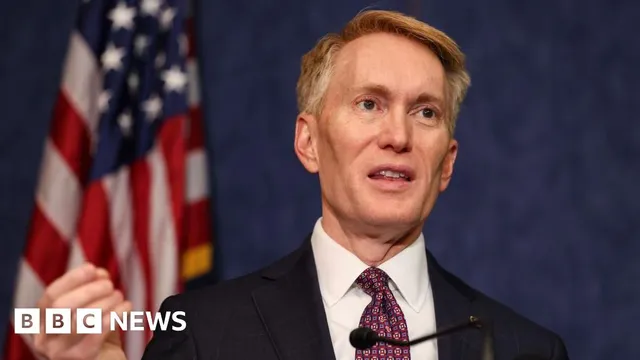
Republican senator demands probe into Trump officials' Signal chat
2025-03-31 07:06- Republican Senator James Lankford has called for a probe into the Trump administration's Signal chat.
- The chat involved discussions on military operations that were inadvertently shared with a journalist.
- This incident highlights ongoing questions about accountability and protocol for handling classified information.
Express your sentiment!
Insights
In the United States, recent developments have emerged regarding the Trump administration's handling of classified information. Republican Oklahoma Senator James Lankford publicly expressed on CNN that there should be an independent investigation into the administration's use of an encrypted messaging app to discuss sensitive military operations. This follows a situation where Defense Secretary Pete Hegseth and others shared classified details inadvertently on Signal after accidentally including a journalist in the chat. The conversation centered around upcoming airstrikes on Houthi positions in Yemen, raising serious concerns over protocol and national security. The group chat, which was meant to be private, was reportedly compromised when National Security Advisor Mike Waltz mistakenly added Jeffrey Goldberg, the editor-in-chief of The Atlantic, to the conversation. Following the reports of this incident, which broke on March 24, 2025, Lankford has joined a small cohort of Republicans who believe that further investigation is warranted. They have argued that the lack of accountability raises questions about how classified information should be properly handled within the administration. Despite the bipartisan push for answers, President Donald Trump stated that he would not allow any personnel changes in response to this situation, reaffirming his confidence in Waltz. This has led to a division among lawmakers, particularly notable after Senator Mark Warner addressed the consequences that might be faced by military officers or CIA agents involved in similar breaches. Current discussions around accountability in government practices surrounding classified information have prompted calls for greater transparency. Some Democrats have stressed that if this were an employee in the military or a CIA operative, they would face immediate disciplinary action, illustrating a perceived double standard in handling potential breaches of security. As the fallout continues, public figures and media personalities have criticized the administration's response to the situation. Comedian John Oliver highlighted the absurdity of the emojis shared in the group chat during his show, suggesting that their usage after discussing airstrikes was inappropriate. He characterized the handling of such serious matters by the Trump administration as a pattern of incompetence and insensitivity. This incident serves as a reminder of the broader implications of communication protocols in government sectors dealing with sensitive information, and many speculate what the lasting effects will be for the individuals involved as well as for the institution itself.
Contexts
The history of classified information breaches in government reveals a concerning trend of vulnerabilities and security failures. These breaches often stem from a combination of human error, inadequate safeguards, and deliberate espionage, leading to significant consequences not only for national security but also for public trust in government institutions. The timeline of such breaches is punctuated by notable incidents, including the Pentagon Papers leak in the early 1970s, which illuminated the risks associated with bureaucratic secrecy. In more recent years, incidents such as the Edward Snowden revelations in 2013 exposed extensive government surveillance practices and the mishandling of classified data, further igniting public debate on the balance between national security and civil liberties. The consequences of these breaches are multifaceted, impacting national security, international relations, and the perception of governmental transparency. Security lapses can lead to unauthorized access to sensitive information, endangering operatives and intelligence sources while potentially undermining diplomatic efforts. The aftermath of the recent leaks has prompted numerous government investigations and policy revisions, as officials strive to better protect classified information while addressing the public's demand for accountability. Additionally, breaches have necessitated the implementation of stricter security protocols and greater oversight, although critics often argue that such measures have not sufficiently addressed the root causes of the problem. Exploring the motivations behind these breaches reveals a complex interplay of factors, including ideological beliefs, economic gain, and personal grievances. Whistleblowers, such as Snowden, often justify their actions as a means to expose wrongdoing, sparking debates about the ethical implications of leaking classified information. Conversely, espionage conducted by foreign actors seeks to exploit weaknesses in national security for strategic advantages. This dichotomy highlights the ongoing need for robust counterintelligence measures and a critical reevaluation of the laws governing state secrets, particularly in an era where technological advancements continuously reshape the landscape of information security. Looking forward, the government faces a challenging landscape in safeguarding classified information. Cybersecurity threats have escalated in sophistication, with nation-states and criminal organizations actively seeking to exploit vulnerabilities within government infrastructures. The rise of remote work and digital information sharing has further complicated the management of sensitive data, necessitating a shift in how classified information is monitored and protected. As the frequency of breaches increases, it is paramount for government agencies to prioritize security training for personnel, invest in advanced cybersecurity technologies, and cultivate a culture of accountability that encourages reporting and addressing potential risks before they materialize.